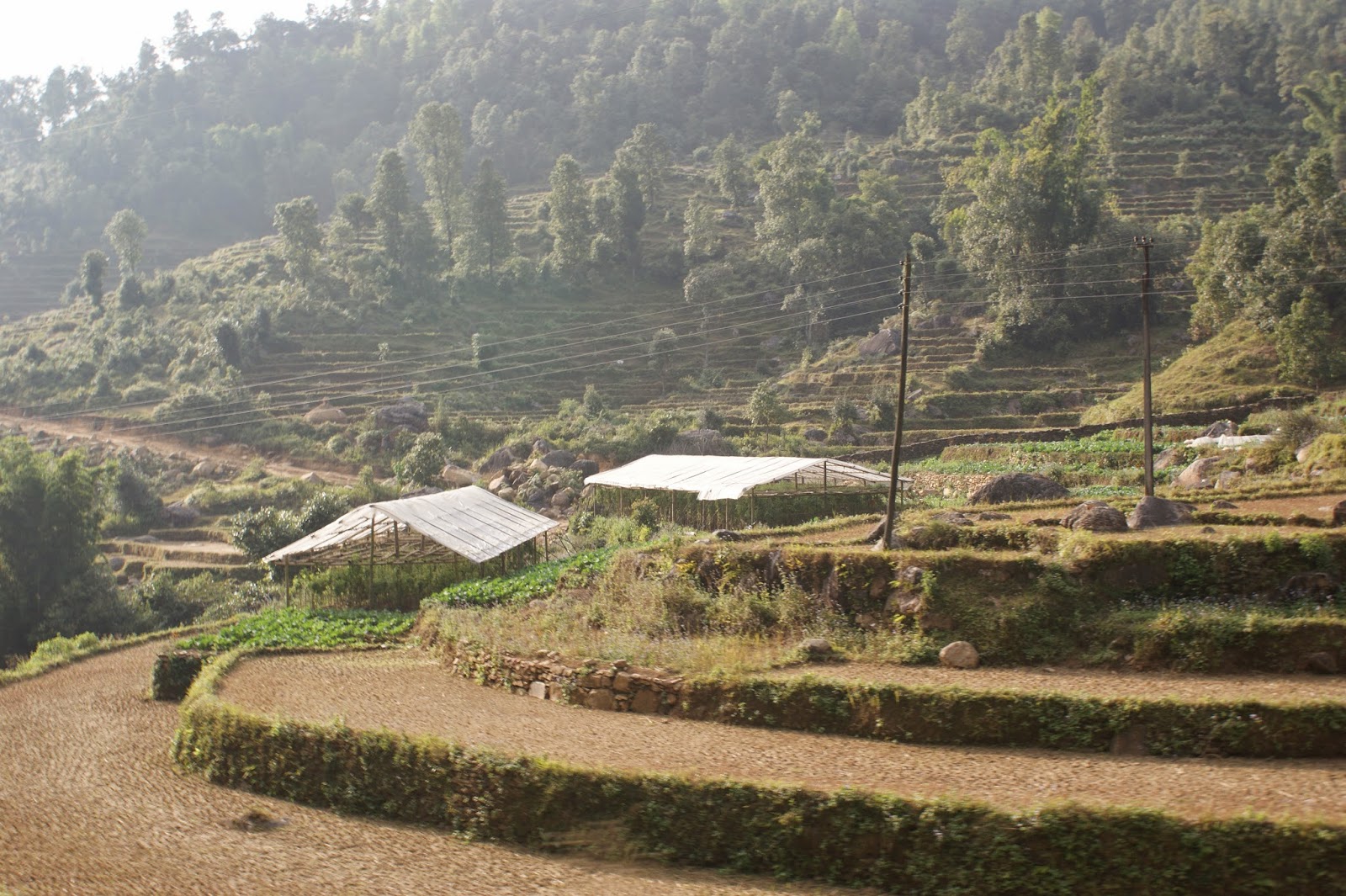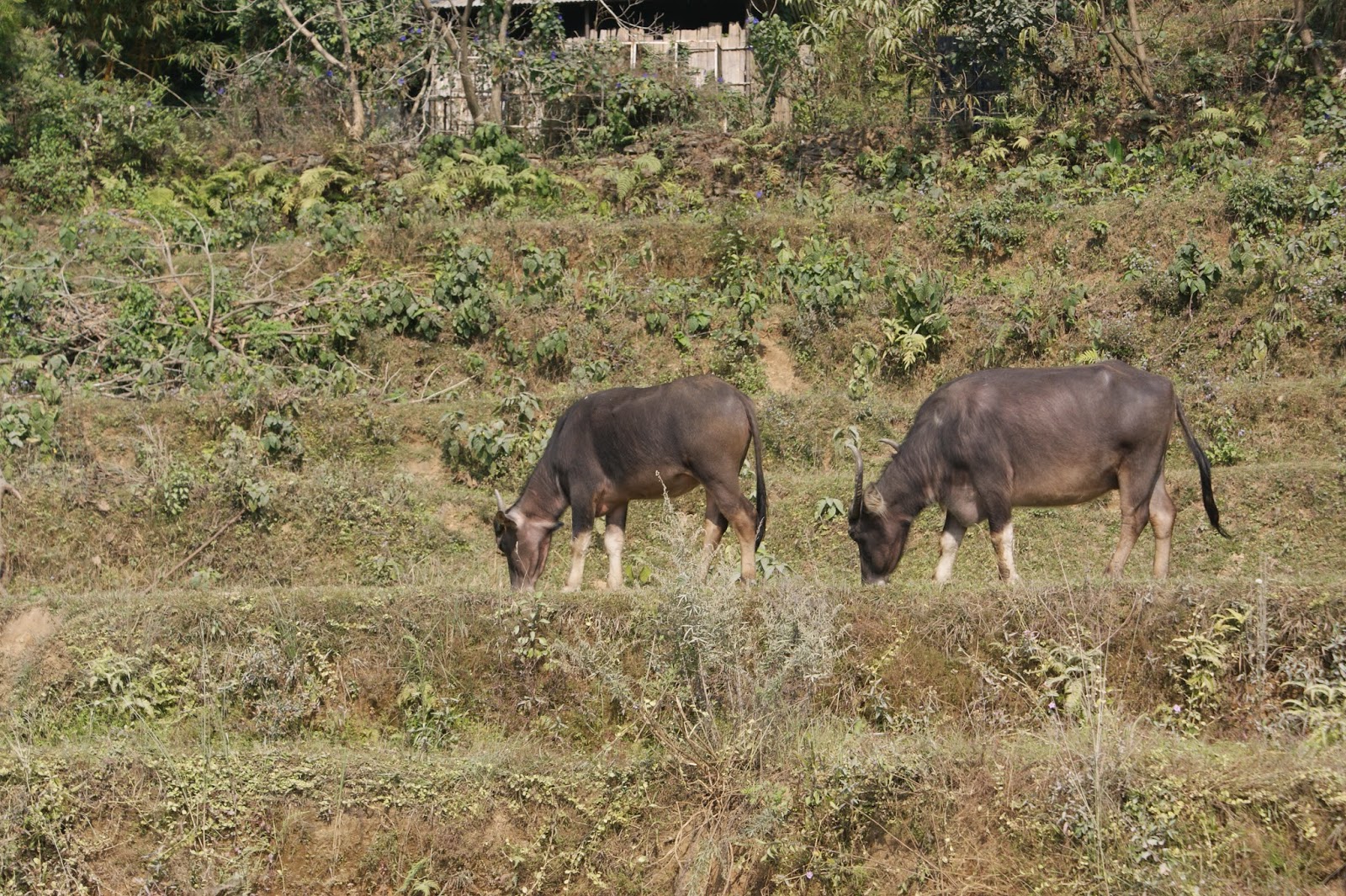Heading down was as torturous as down hills
are. When doing so, you are using your crappy hamstrings instead of your
awesome quads and glutes. Your balance
is off and your footing always feels a little unsteady, like a skid on your bum
is imminent at any step. And the stones
and rocks and silty dirt suddenly become the rug that gravity wants to yank out
from under you. It’s a tough go, and
you’re still hot and a bit tired from going all that way up there.
It’s the only way down though, so you do it
and as you move along you realize your heart isn’t pounding as much and the
sweat is drying from your forehead a little bit and maybe it isn’t so bad to
have to go all the way down again. Who knows, maybe a cab will be waiting at
the bottom that you can take back to town?
At this point in the season the rice is
nearly all harvested in this area, so the farmers are working hard on making
their paddy stacks (the hut shaped rice chaff piles) which is actually really
interesting to observe. They stick a tall post
into the ground and spread the first chaff all over the ground in quite a thick
pile. Then they take two ox or three
scrawny horses side by side and walk them merry-go-round style around the pole,
letting their legs wind the chaff tighter and tighter creating a solid, circular base to stack everything else on in
a nice, tight pile. Then after piling the
bundles of chaff up and up and up, they complete it with an angled roof to
deflect some of the rain over the season.
I hadn’t considered how the stacks were made so hiking when this was
happening was neat.
On the way up, everyone was working but on
the way down people began to break for lunch.
Most people called out a Namaste to me and I would reply but not stop
walking. Then a boy of about 15 came
chasing up the paddy to say hi to me, he seemed genuinely happy to greet me so
when he invited me down to where lunch was happening I thought, sure why not go
convene with the locals? Besides, maybe I could ask a few questions about what
they were doing.
 His family was about 6 or 7 women, one
quiet old man and himself, a 7 year old brother and about a 4 year old boy. I was engaging him and his brother asking how
much English they spoke, which they both did because they go to an English
school so I was thinking it was pretty neat to stop and chat with the locals in
my own language and everything.
His family was about 6 or 7 women, one
quiet old man and himself, a 7 year old brother and about a 4 year old boy. I was engaging him and his brother asking how
much English they spoke, which they both did because they go to an English
school so I was thinking it was pretty neat to stop and chat with the locals in
my own language and everything.
The ladies kept calling things out to him
so finally he stopped and asked, “So do you have any chocolates for the baby?”
which instantly deflated my interest in being there in that moment. “No, I don’t have any chocolates, do you have
some for me?” I replied, with a friendly smile but also an interest in seeing
his reaction. He looked a little
confused, because why would he have chocolates for me when Willy Wonka
Foreigner was walking through his turf?
He also quickly asked if I wanted to take pictures of his family, which
I sensed would come at a financial cost, so I politely declined and headed back
to the path.
I was really disappointed that happened and
all the rest of the way down and back to the guesthouse I was quite bothered by
the whole encounter. I thought I read
the situation right. I thought maybe it
was a novelty for the family to talk to the strangers that visit their country,
but I was wrong. It seems like a simple
encounter and that someone asking for chocolates is no big deal, but here is
basically says, you’re not from here, you have things, give me those
things. Would you ever ask a random
stranger for chocolate? Not likely.
I felt a bit reticent to write this post so bluntly because there’s something about being negative that makes me pause
and think about my assumptions and as well, about how fair it is to discuss
them in a forum to which the parties I am talking about are not invited. I recognize that I could have read the
situation entirely wrong, but then a conversation this afternoon with the owner
of Sacred Valley Inn where I am staying (a UK born Canadian cum Nepali
resident) made me feel less crazy and cynical about the experience. She even said that in her 20 or so years here
she has developed a certain ear for a genuine Namaste or the “I want something
from you” Namaste. Mostly though, she
says she ignores calls from strangers because even after this long here, people
in her own neighbourhood pester her about giving them things like treats or
chocolates because she appears to be a foreigner despite marrying a Nepali man
so long ago.
She personally feels that the people living
in the areas where tourists frequent (Sarankot in this instance) have been a
bit spoiled by handouts, or have developed a culture of begging where there
never was one before. We, westerners, go
to developing countries with trinkets to hand out because we see that people
don’t have as many material goods as we do and we figure, hey, it’s just a pen
or a balloon or a soccer ball, people need this stuff. But they don’t, not really.
In my opinion, it creates the impression
that Santa Claus has come to town, that we have so much wealth that we can
instantly give it out like a no-strings-attached ATM machine. Meanwhile, myself, and many other travellers,
devote quite a bit of the household budget to go places and experience new
cultures. We are not endlessly wealthy,
we are relatively wealthy, but the ratio for my cost of living to the cost of
living here still leaves me as part of the working class strata (when I have a
job that is, right now I’m just a bum student—even worse!).
This idea of handouts is quickly becoming
one of my pet peeves about travelling because I saw it happen in Senegal where
I lived for 2 months, in Guatemala where I was part of a mission’s team for 2
weeks, and in in many other places where begging or stealing or swindling has
become part of the imbedded local culture.
Where does it stop, you might be
wondering? It stops with people from
developed countries or privileged positions not handing crap out to local
people, I think it’s as simple as that. If that were to happen, it would take time to undo the culture
of begging because it took long enough to develop it.
 |
| Tomato tunnel money makers. |
I’ll also add in a thought that Nathan and I
both agree on, which is begging, like proper asking for money begging, also
causes harm because it’s an unsustainable and shallow income stream. Unsustainable because the beggar doesn’t know
where the next dollar or rupee is coming from if it’s coming at all, and
shallow because the skills people are being paid for aren’t transferable. If
you think of ‘beggar’ as a work position, what are they qualified to do outside
of begging? What are you really paying
them for? Especially in the instance of
children where the window for long-term reintegration into ‘normal’ society is
so wide open, why encourage them to stay on the street so their family, or
Maribou or brothel owner can make money off of them? Right now in Kathmandu many street kids,
mostly boys, are self-funding an addiction to huffing glue thanks to the generous handouts they receive.
At any rate, I welcome your comments, thoughts, or experiences on this topic, because I find other people's take to be really interesting.

Well, that was a huge letdown for both of us. I was hoping for a vernicious knid.
ReplyDeleteI guess it's an easy way for travellers to feel good about themselves without thinking about it too much. I have never understood feeding ducks in a pond. They are not toys there for my amusement, they are animals trying to get by and how does my feeding them bits of bread to watch them swim around really help in the long run. There is the worst analogy you will see today. Miss you!
So many parallels to our experience in Morocco. Hard to have a genuine/personal interaction with most people we encountered. Although a few were curious about us, most seemed to see us as the "cash cow" and we're very persistent in their attempts to part us from some money. Still, I think the origins of this relationship are very old and complex and probably related to the history of foreign intervention and attitudes in these countries/cultures. A long discussion we could have, no doubt!
ReplyDelete